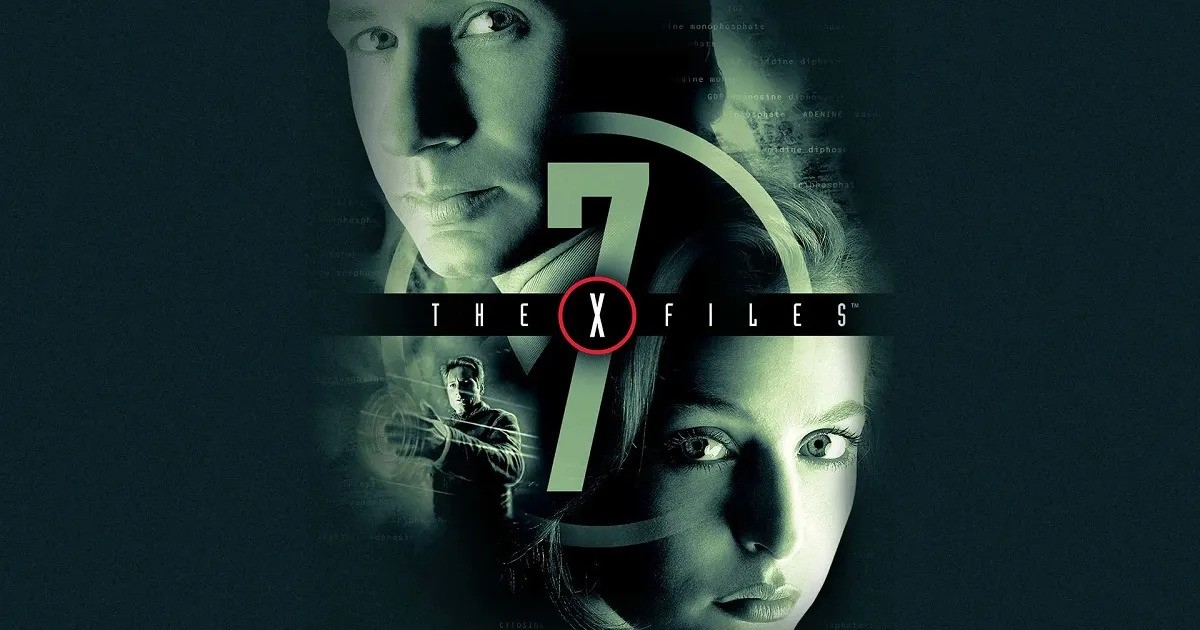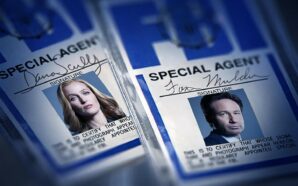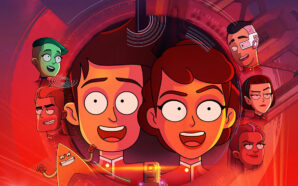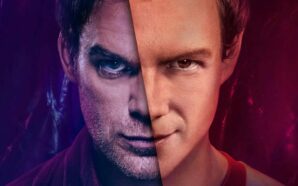What is there to say about the seventh season of The X-Files? Not much. For the first time writing one of these ‘best & worst’ articles I’ve written all the following ‘awards’ first and left this introduction to last. There are individual episodes of high and low quality but together the season has very little personality. No defining flavour. Even the disappointing sixth season had a unique feel, with the LA sun and comedy episodes making it stand out, regardless of quality. Season 7 has nothing. The new Californian look continues but nothing interesting is made of it, the season frequently has a light-hearted tone but it’s not a comedy season the way six was. There’s a couple of bold, fresh episode ideas dotted across the season but not enough to break the general malaise and feeling of tiredness, from the format, cast and crew.
The X-Files is dying. Not dramatically but slowly and surely. The mythology storyline is left adrift with the writers having no idea how to continue it, and the standalones feel repetitive. Most episodes rely on the chemistry of Mulder and Scully to scrape by as enjoyable television but even Duchovny and Anderson can only do so much. The eighth season will offer the show the revitalizing jolt of energy needed to revive itself but only after it comes so close to death, and cancellation, in season seven.
If there is one propulsive element of the seventh season, one purpose to the narrative, it’s that it tries to wrap-up the character journey of Fox Mulder. Much like season five (and later nine and eleven) this season was written to be the last. David Duchovny’s contract was ending and he made it apparent he was done as a series regular on the show. Showrunner Chris Carter and his team of writers therefore set out to end Mulder’s time on the series as satisfactorily as possible. And as lame as much of the 22-episode run is, the major beats for Mulder are a highlight.
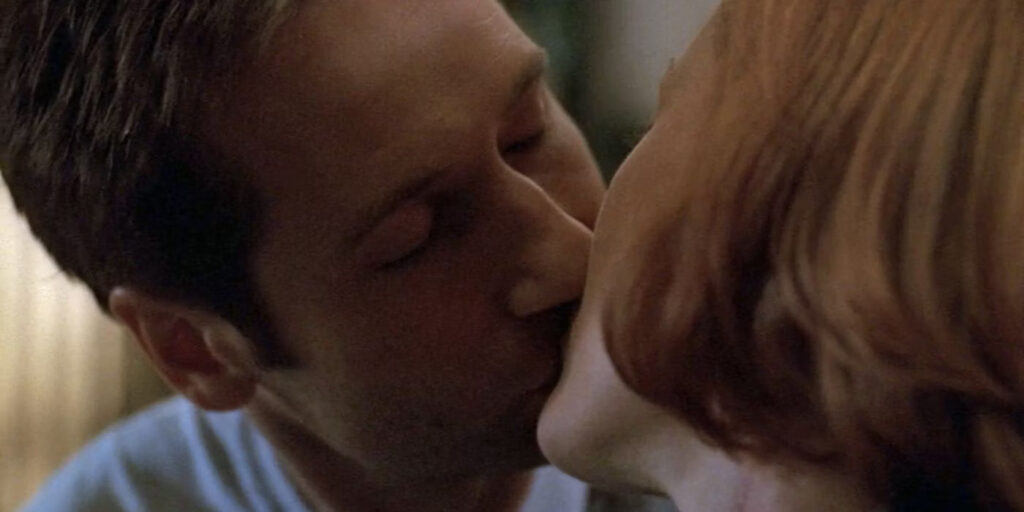
Best Character: Mulder
If this was the final season then I would be outraged for Scully. She gets very little development and little to do in the general, especially in the bigger mythology episodes, but given ultimately the show continues with her and not Mulder, focusing on Mulder this season paid off. I still wanted more of Scully but it’s understandable that Mulder be the more dominant character as the season heads towards what could have been his final appearance. He’s quite comfortably the best character this season.
There’s a fine line between David Duchovny’s chilled vibe, underplaying everything, and just being flat and emotionless. Too often in season seven it feels like the latter. Anderson and Duchovny can now play these roles in their sleep and sometimes it feels like they are. They have great chemistry and charm, the two of them can keep a bad episode from feeling totally useless, but, like the writers, it feels like they are sleepwalking through this season. It’s a joy then when they receive a great script and the performers suddenly come alive again. The Goldberg Variation is a wonderful, charming episode, almost capturing the feel of the Darin Morgan episodes of season three, and it’s plainly visible to see how Duchovny and Anderson rise it its quality. Anderson also seems to enjoy and feel more comfortable with the comedy episodes later in the season. Hollywood A.D. sees Scully act (and laugh) much more like Gillian Anderson naturally does, and while it’s a risk making a character more like their actor, it gives the show some needed joy and life.
Mulder’s farewell tour closes out the lingering plot threads more ably than I was expecting. I’ll write about the revelations regarding his sister Samantha in greater detail later but, as controversial as it is, that story largely works for me. What I think the show nails is Mulder’s fate as the season ends. There is no better ending for the character than being abducted by aliens. He finally finds what he’s been searching for, vindicated in his beliefs, and disappears in a transcendent bright life, religious overtones aplenty. I don’t need Mulder and Scully to end up together but instead for Mulder to reach the destination his isolating life choices have led him to, even if this wasn’t the way he expected to find his answers. While there are upcoming episodes with Mulder that I enjoy, in his recurring role in the next two seasons and starring role in the modern revival, this should have been the last time we saw the character. There is no better ending yet it ceases to be an ending when we immediately see him again in the opening scene of next season’s premiere. I love the ambiguity to his fate; what happens after his abduction is irrelevant.
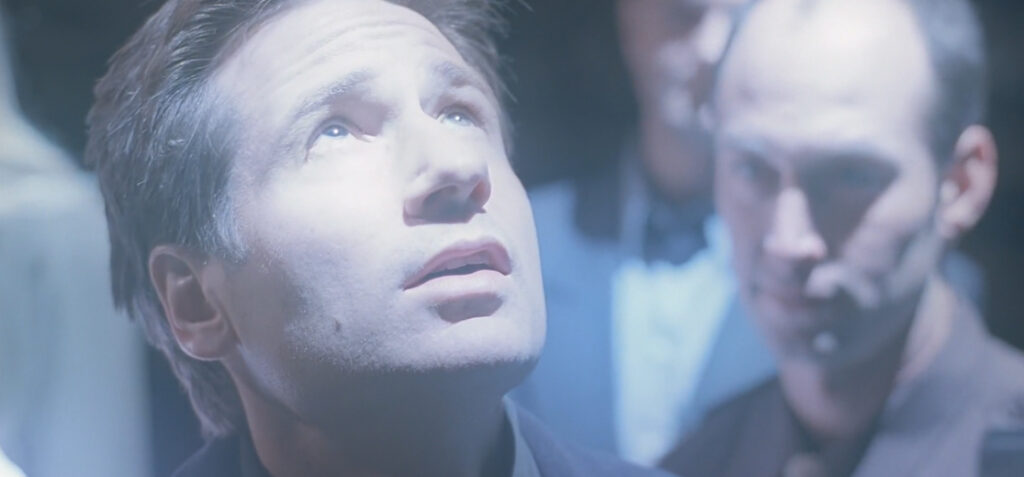
The Most Average Episode: Theef (S7E14)
The format of this article is likely to offer a false impression of the seventh season of The X-Files. I write about the best of the best and the worst of the worst, 22 episodes of television condescended to its greatest and weakest moments. Such dichotomy is a fallacy when it comes to this season. It was awfully difficult to choose most of the following discussion points because season 7 is so incredibly average. So middle-of-the-road. There are some high points and low points but most of the season exists in a general, tired malaise. Therefore, before we truly get going, I thought I’d highlight the most average episode of them all: Theef.
It’s not bad, nor is it particularly good. Watchable but, given I only watched it a couple of days ago and can barely remember the details, quite forgettable. It’s a basic revenge plot: a creepy baddie avenging his dead daughter by terrorising a family of doctors with hexcraft. It’s a by-the-numbers, unoriginal episode that feels like the show churning out another story seven seasons in, because that’s what it is. Theef is the most average episode of the season and the most representative of the season as a whole.
Biggest Disappointment: Orison (S7E7)
The third of three sequel episodes to previously standalone episodes, Orison is sadly more Kitsunegari than Tooms. I love season two’s Irresistible but we never needed to see ‘death fetishist’ Donnie Pfaster again. And certainly not like this. The original episode was light of paranormal elements; Pfaster appeared very briefly in a couple of shots as a demonic form, which were meant to be taken as metaphor and subtext rather than literally. Orison rejects that idea and not only turns the story actively supernatural, it can’t decide what the supernatural element should be. Pfaster is confirmed to be a demon. Reverend Orison is an agent of God, who has drilled into his own head to give him hypnosis/time stopping powers. And Scully keeps hearing the same song everywhere she goes.
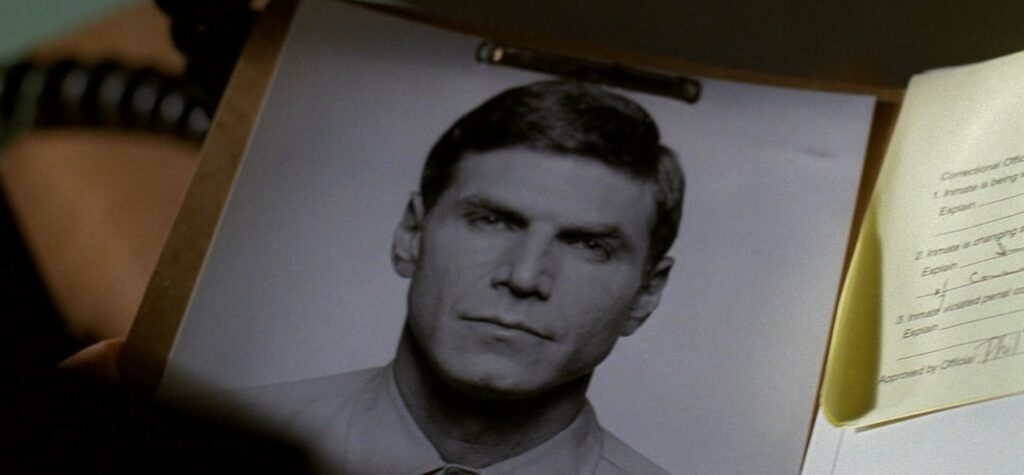
It’s an episode that removes any subtlety from Irresistible and throws a bunch of disparate elements together that never fit. Pfaster is a much less threatening character now, with his victims managing to escape his grasp, before Scully guns him down in cold blood. As it stands, I don’t think it’s a moment which fits Scully’s character, although it could have been an interesting development if the episode actually bothered to explore the choice rather than ending the episode with the kill, never to mention it again.
Scariest Scene: Mulder vs Zombies in Millennium (S7E4)
I was worried The X-Files would never again be scary. The move to Los Angeles after season 5 not only brought the show out of the dark woods and into the sun but also ushered in a lighter tone. Horror was falling on the show’s long list of genre descriptors. Millennium is an episode trying to accomplish many things. It’s a backdoor series finale for The X-Files’ sister show, Millennium, which had just been cancelled and had to try and wrap up that storyline while also being an accessible monster-of-the-week story for the many millions of viewers who had never seen it. As one of those people (although I’ve bought the DVD boxset and plan to start it after this X-Files rewatch) I thought the episode was fairly silly but with one scene brought the show back to the horror roots it had become estranged from. Mulder, locked in a basement, fighting four zombies. It’s an effectively creepy scene, with the undead rising from the soil and hunting Mulder, running at him years before fast zombies become the norm. And the biggest reason it’s scary: it’s dark! The California sun is nowhere to be seen and the sequence has actual atmosphere, contained to a confined dark place where some red flares are the only light source.
Best Monster: Rob Roberts in Hungry (S7E3)
Sympathy for the devil. Not only a classic Rolling Stones song but also, seemingly, Vince Gilligan’s writing mantra. Years before creating Walter White, he was doing the same thing on The X-Files, making the viewer feel sympathy for characters who would otherwise be portrayed as exclusively villainous. Rob Roberts is a character in this mould, a young man struggling with an eating disorder: the desire to consume human brains. In a bold move he’s written as the star of the episode. We follow Rob through the story with Mulder and Scully almost presented as the baddies, reappearing in his orbit, trying to uncover his secret.
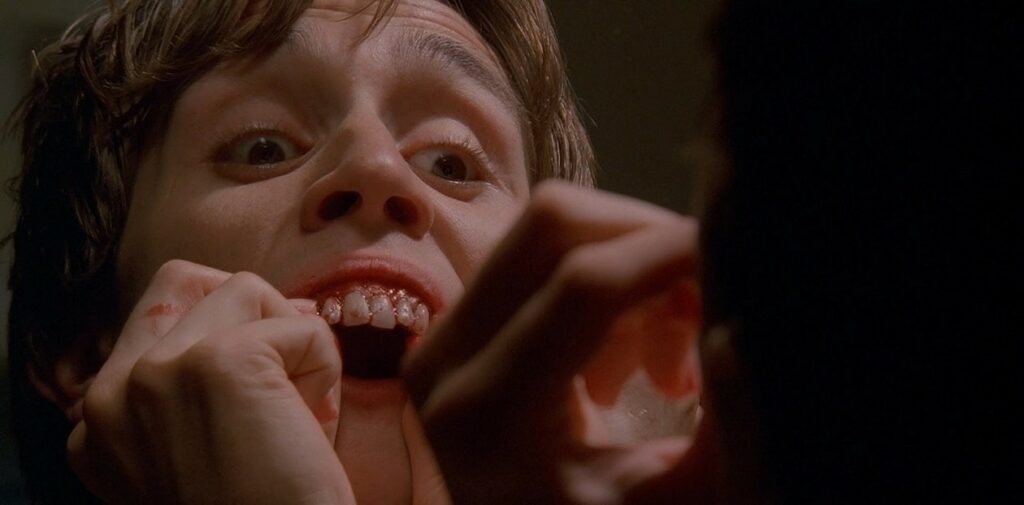
Actor Chad Donella does a good job of holding up the episode by himself, no easy feat, and Roberts is both a relatable man and a hideous monster. There are some bad visual effects of him attacking his victims but the practical effects are a brilliant bit of body horror. There’s an effective escalation and reveal of Rob’s true monstrosity, and his almost featureless shark-like form is very unsettling. By the end we’re begging him not to kill his sweet neighbour but he just can’t help himself. Our allegiances are torn. The monster is gunned down and while it’s the right action to take it’s also deeply sad.
Best Guest Star: The Cast of Je Souhaite (S7E21)
Usually I’d highlight one guest performance from an entire season, but here I have to celebrate three from just one episode. Je Souhaite is a brilliant script by Vince Gilligan, who also directed the episode, and it’s cast perfectly. Mulder and Scully are certainly enjoyable in the episode but it’s the scenes exclusively with the guest cast that really shine. Kevin Weisman and Will Sasso (the man who makes me miss Vine) play brothers Anson and Leslie Stokes who find a genie, Paula Sorge as Jenn, and debate over what their three wishes should be. The interplay between them is brilliantly funny. The Stokes brothers feel very much like Gilligan characters: he would go on to write other loving yet argumentative doofuses in Breaking Bad. They kind of feel like proto versions of Jesse, Badger, or Skinny Pete. Their stupidity could be annoying in lesser actors’ hands but instead they are never not charming. Not charmed however is Jenn. I don’t know if Paula Sorge is a good actress, I haven’t seen her in anything else, but this role as a tired-with-humanity, eye-rolling genie perfectly matches her energy, making her an entertaining foil and, ultimately, the soul of the episode.
The ‘What the Hell Did I Just Watch?’ Award: First Person Shooter (S7E13)
Essentially a Holodeck malfunction episode of Star Trek transplanted into The X-Files, First Person Shooter is an embarrassing watch. A scantily-clad male fantasy AI villainess is somehow slaying players of a virtual reality game, and Mulder and Scully have to investigate. While the show is known for its elasticity in storytelling, this doesn’t feel like The X-Files. Its biggest issue however is that it never decides whether it’s a parody or an earnest story. The episode clearly takes such joy in the action sequences and the lurid shots of its lead actress that any attempt to comment on violence or sex is rendered meaningless. The arguments for and against the game put forth by Mulder and Scully are so exaggerated that an actual discussion can’t be had. And First Person Shooter does The Lone Gunmen dirty. Instead of noble truthtellers, the episode presents them as consultants for the studio behind the game, only wanting to solve the murders to secure stock options in the company. Co-written by William Gibson, pioneer of cyberpunk and scribe of previous episode Kill Switch, First Person Shooter is a stain on his career, making him seem like a hack rather than the prophet his other work suggests. Although, it’s not an unentertaining watch.
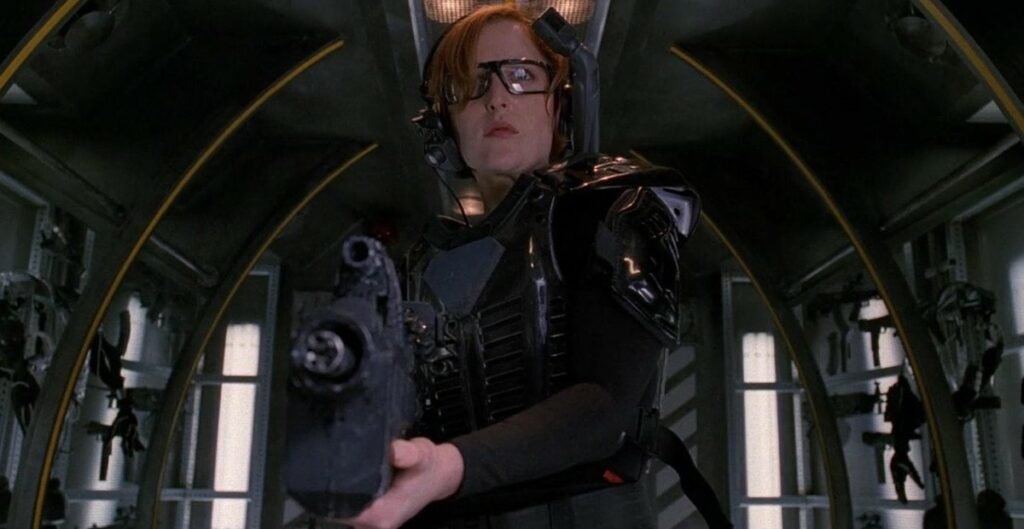
Underrated Episode: Closure (S7E11)
Closure isn’t a great episode yet it manages to do the impossible. The Samantha Mulder storyline is a tangled mess of convoluted threads and endless clone copies. With Duchovny leaving at the end of the season, the writers vowed to bring it to some sort of conclusion, find some kind of closure. And shockingly they managed it. The answer: she’s been dead the whole time. Many fans were outraged at this but I admire the balls to do such a thing. Abducted by the Syndicate and experimented on, spirits known as ‘Walk-ins’ took pity on her and whisked her soul away to some heavenly plane. It sounds stupid, and it kind of is, yet the episode makes it work. Mulder connects with her spirit, hugs her, and is freed of his burden. It would be far too saccharine if the rest of the episode wasn’t so dark and tragic. It’s played against Mulder’s mother’s suicide and a serial killer of kids, some of whom were saved by the ‘Walk-ins’ and some whom very much weren’t. The episode is a nice little character study for Mulder and, as controversial as it is, I think ends the Samantha storyline in a bold way that is far from perfect but more satisfying than it deserves to be.
Anderson vs Duchovny: Hollywood A.D. (S7E19)
As shows become successful usually the lead actors will be granted honorary producer credits. The X-Files did one better. Both Gillian Anderson and David Duchovny wrote and directed an episode in season 7. But whose is better?
Anderson’s effort is all things. It’s a unique episode, striking a very different tone and style than any other, but it’s an episode where a lot could have gone wrong and it does. I want to like all things a lot more than I do but I don’t think it works. I appreciate the attempt at a Scully character study, looking at her life and wondering whether this is really where she wants to end up, feeling like the full measure version of the half dose given in Never Again. I don’t mind the slower pace or the introspective drama or the complete lack of a case. It’s the supernatural element that bothers me most. Scully’s former teacher/partner is in hospital and she has a sudden spiritual epiphany that takes the form of very nineties new age mysticism. I find spiritual healing, the idea that positive thinking cures cancer, and the phrase “everything happens for a reason” to be equal parts embarrassing and repulsive. Sadly, that’s the world the episode lives in and supports, with Scully’s insight being given by a vision in a Buddhist temple. Mix that with slow motion shots of Scully with Moby playing and the episode takes on a shallow ostentatiousness instead of genuine depth.
Duchovny’s episode is on the complete other side of The X-Files scale. Hollywood A.D. is one of the silliest episodes of the series. It doesn’t all work, some of it is too goofy even for me, but enough of it does for it to be entertaining. Mulder and Scully are followed by a screenwriter on a case and then see their lives misrepresented when a Hollywood movie version hits the big screen. It’s a fun idea, with plenty of meta ammunition for good gags. Sadly, it doesn’t quite live up to its potential. Mulder and Scully (and Skinner) in Hollywood is the interesting part of the episode but too much time is wasted on the opening plot about corrupt cardinals and fake manuscripts. But what Hollywood A.D. comes down to, to determine whether it is a success or not, is: is it funny? And yes, it is. It’s not reaching for the depth all things is attempting so it’s not a disappointment when it fails to reach it. It’s shallow but entertaining: the less interesting yet the better of the two episodes.
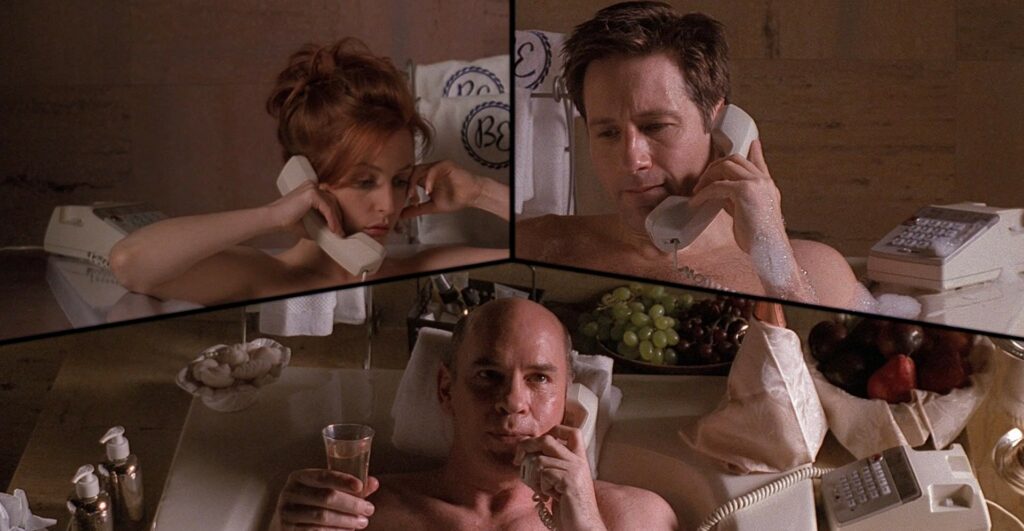
Worst Mythology Episode: The Sixth Extinction (S7E1)
Last season I thought Biogenesis was bad. Turns out the follow-up is even worse. The X-Files has told interesting religious stories in the past, with Scully’s Catholicism and the subtext of Mulder’s search for answers. Now Chris Carter seems incapable of subtext or subtlety, blurting out ideas the most ardent conspiracy theorist would refute. This is a spiritual arc of the show, a trilogy of episodes that is less interested in seeing characters wrestle with concepts and more just shooting them at point blank range with them. Aliens are gods and the original writers of the bible. Mulder is the new Jesus, his virus-awakened alien DNA making him the most important man in the world, and he’s seen in a Christ pose as the devilish Cigarette-Smoking Man tries to claim his power. Meanwhile, Scully is experiencing plagues and resurrection in Africa, and repeatedly has visions of a “Primitive African Man” who seems to be an alien/god/‘magical negro’ trope all in one. It’s all so stupid and unsubtle.
The episode also fails as part of the grand mythos arc of the series. If these aliens have the power of creation and destruction, a single UFO having godlike powers, then why this extremely complicated colonisation plan? Why the need for the human conspiracy? Meanwhile, Mulder’s new telepathy is an incredibly non-satisfying way to reveal details about Skinner’s blackmail plot and Fowley’s true allegiance. It feels very cheap. Kritschgau reappears to tie off that loose end but the role his character serves is the complete opposite of what makes sense. The guy who convinced Mulder that aliens don’t exist and everything was a government conspiracy, which he himself genuinely believed, is suddenly an expert on alien telepathy. And any episode that begins with a pretentious voiceover is skippable. It’s Carter trying to be poetic but it never fits the voices of the characters. They don’t speak like that, which is especially an issue here where the voiceover is supposed to be Scully emotionally writing to Mulder.
Best Mythology Episode: En Ami (S7E15)
The X-Files mythology is essentially over. While the extraterrestrial threat is, apparently, still out there, the conspiracy is no more and the story has nowhere left to go. That makes new mythology episodes almost impossible to write without feeling like pointless endeavours. Yet En Ami is one of the best episodes in this serialised overarching plot in seasons and it’s down to one man: William B. Davis. While Anderson and Duchovny both got to write and direct instalments of the show this year, the Cigarette-Smoking Man himself, Davis, also wrote a script, the best of the three. It avoids all the usual pitfalls of mythology episodes and manages to be a tightly-plotted, comprehensible conspiracy story that also works as an insightful character drama.
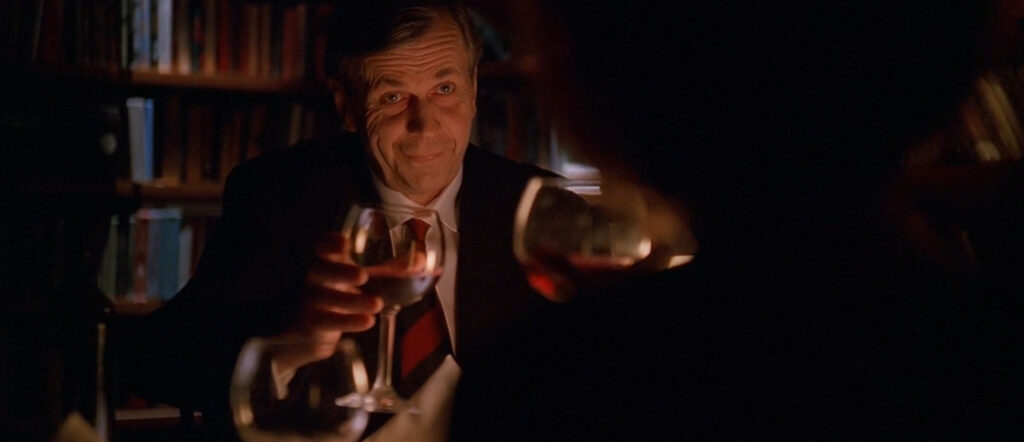
The Smoking Man is an icon of the show and often is little else: a symbol, a recognisable image, the emblem of some larger evil. I always enjoy when the series dared part the smoke and actually explore him as a character, although demystifying him is a big risk if the writers then intend to go back to using him as an inscrutable villain. It worked with Musings of a Cigarette-Smoking Man and now it works again with En Ami. Dying of terminal disease, CSM vows to make amends for his past deeds and give Scully the cure for cancer if she joins him on a road trip. It’s obvious to any viewer it’s a ploy, and the show comes close to more unsubtle references to him being the devil, bartering Faustian bargains, yet the humanity of the man shines through. The episode finally focuses on Scully more than Mulder as she tries to navigate their nemesis, and the Smoking Man, despite betraying her, does reveal genuine vulnerabilities. It’s an almost tender performance and the scenes between him and Scully, either in the car or eating at a fancy restaurant are wonderful.
The only issue I have is that this is not the end of the character’s story. The Cigarette-Smoking Man will go on plotting, dying, and being resurrected for four more seasons but it should have ended here. He’s an evil man but clearly a sad and lonely man, too. In the final scene he throws the cure that could save his life into a lake, refusing to use what he betrayed Scully for. Instead he lights up a cigarette and accepts his fate. If only. When he reached into his jacket for the cigarette I almost expected him to pull out a gun and shoot himself. The cigarette has the same implication, although is the much slower option. It’s a suitably miserable, human, and bitter end for the character. He doesn’t try to redeem himself but instead decides to condemn himself. I wish this wonderful script by Davis himself was the last we ever saw of The X-Files’ most iconic antagonist.
Worst Standalone Episode: Fight Club (S7E20)
The X-Files expanded its tonal palette far wider than creator Chris Carter ever envisioned. Writers could come in and write a Mulder & Scully case in their own style, and with Darin Morgan and Vince Gilligan the show stretched itself into becoming a comedy. Different writers had very different flavours, sticking to their preferred style. Yet nobody had the power over Carter to tell him to stay in his lane. To focus on the paranoia, conspiracy, and investigative elements. There was nobody willing to tell Carter that he is painfully unfunny. And so we get Fight Club. A comedy episode written and directed by Chris Carter, which is tragically, painfully unfunny.
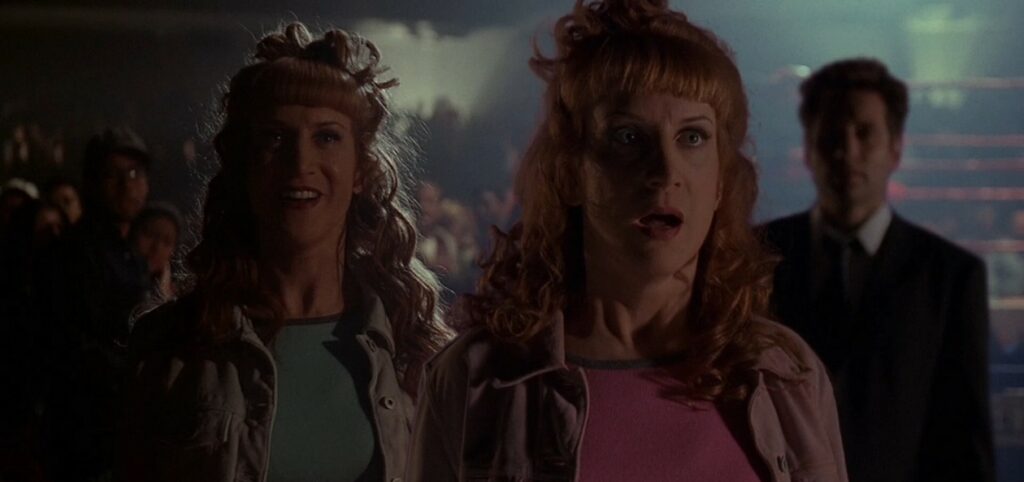
Fight Club is embarrassing to watch because it is clearly trying so incredibly hard. It has a ‘look how silly and goofy we’re being!’ attitude to it. Every element, from the pantomime performances to the music is screaming at the audience to make sure they understand how wacky it’s supposed to be. Yet every joke falls flat, made extra apparent by the episode airing between two far superior funny episodes. Carter was trying to get this script off the ground for years, beginning with a kernel of an idea about two doppelgängers who cause chaos whenever they are in each other’s proximity. The finished episode still only feels like a kernel of an idea. There’s nothing more to the plot: identical women keep bumping into one another and everyone nearby goes crazy. Rinse and repeat for forty-five minutes. And the episode does confirm that, yes, there is something more annoying than Kathy Griffin: two Kathy Griffins.
Best Standalone Episode: X-Cops (S7E12)
Just when The X-Files was feeling its most tired, an episode comes along to show how much potential the series still has. X-Cops is an episode unlike any other: a crossover with the series Cops, shot like a real documentary. It never feels like the gimmick it easily could have been because the plot and characterisation justify the style. Shows like Cops often feel like they take advantage of the communities they present in their garish freakshow tone. X-Cops comments on the deprived area the episode is set; the story is all about the fear both the cops and civilians constantly live under. A monster is on a killing spree, taking the form of what its target is most afraid of, feeding on fear that the cops exacerbate. The documentary style also introduces motives for Mulder and Scully. Mulder wants to expose the paranormal on television while Scully at first tries to hide from the camera only then for Skinner to tell her to prove that the FBI have nothing to hide. This forces both characters to exaggerate their own behaviours and perform for the camera in opposite ways.
Of course, the filmmaking style also allows for great comedy. At one point Mulder starts laughing at an arguing couple and it’s unclear whether Mulder himself finds it funny or whether it’s just Duchovny corpsing, but it works either way. It’s an episode that pushes Mulder and Scully into new situations and has them encounter characters they usually don’t. The handheld style is also great for the horror sequences. The long takes following characters down streets and into houses are fantastic, much more engaging than the indulgent gimmicks of last season’s Triangle. I only wish the episode committed even further to the bit, pull a trick Inside No 9 might, and play like an episode of Cops until Mulder and Scully show up: cutting to the regular opening credits kind of ruins it. And writer Vince Gilligan, easily the MVP of the season, wanted to do this episode for years but it was only until The Blair Witch Project was released that Chris Carter approved it. Produced in the year 2000, X-Cops feels like a rip-off even though it’s not. Just imagine how impactful the episode would have been if it was part of the fourth season.
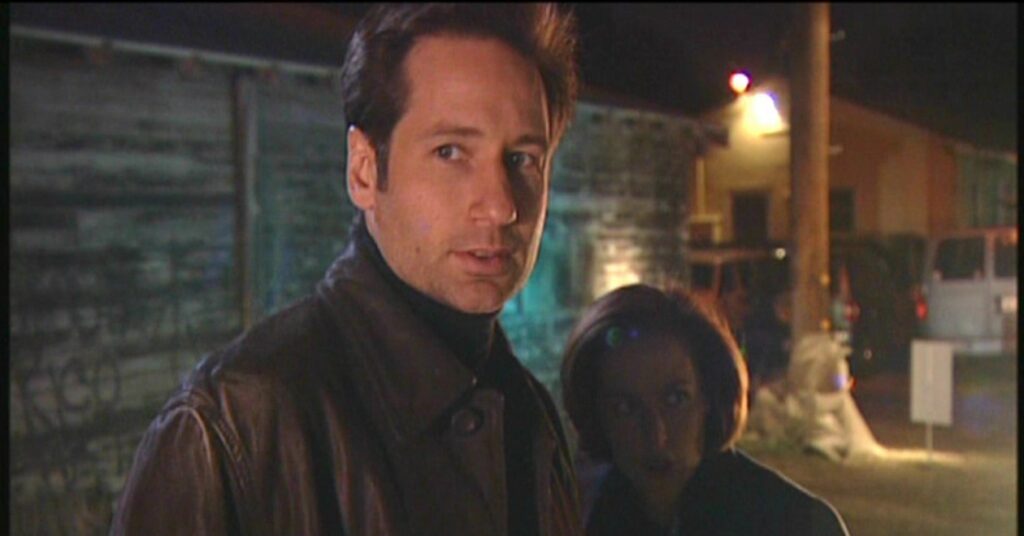
Five Worst Episodes of Season 7:
5. Signs & Wonders (S7E9)
4. First Person Shooter (S7E13)
3. The Sixth Extinction II: Amor Fati (S6E2)
2. The Sixth Extinction (S6E1)
1. Fight Club (S7E20)
Five Best Episodes of Season 7:
5. Hungry (S7E3)
4. En Ami (S7E15)
3. The Goldberg Variation (S7E6)
2. Je Souhaite (S7E21)
1. X-Cops (S7E12)
If the seventh season is The X-Files running on fumes, content with pumping out mostly familiar stories with a light, harmless tone, then the eighth season demands the opposite. The show could have ended but instead the creatives decide to continue the show in a post-Mulder world, necessitating a complete overhaul of the status quo and the desire to return the series to its darker roots. It’s a fascinating season, one I find quite underrated, and I’ll break it down in the near future…




